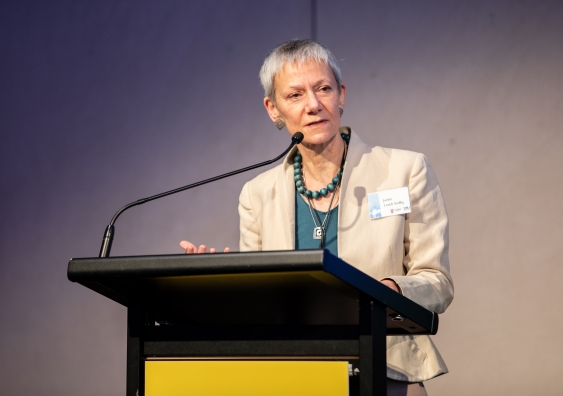Disability Innovation Institute at UNSW introduces new director
Bioethics Professor Jackie Leach Scully will head the Institute to be at the forefront of disability innovation through thought leadership and knowledge exchange.
Bioethics Professor Jackie Leach Scully will head the Institute to be at the forefront of disability innovation through thought leadership and knowledge exchange.

Bioethicist and disability advocate, Professor Jackie Leach Scully, has arrived as director of the Disability Innovation Institute at UNSW (DIIU), a world-first initiative partnering interdisciplinary researchers with people with disability.
With a background in bioethics and social ethics, Professor Scully comes to UNSW from Newcastle University in the UK. She was most recently the Executive Director of the Policy, Ethics and Life Sciences (PEALS) Research Centre, which focuses on the social and ethical debates in contemporary life sciences.
Professor Scully was introduced as the new director of the DIIU during a welcome event on 1 October, which included Dr Ben Gauntlett, Disability Discrimination Commissioner and Graeme Innes AM, Chair of the DIIU Advisory Council and of the Attitude Foundation, among the guests.
Established in 2017, the DIIU connects UNSW scholars, community, industry, services, government and practitioners to promote equality for people with disability by creating and sharing knowledge that is interdisciplinary, innovative and inclusive. Rosemary Kayess, an internationally respected lawyer, researcher and academic and a Visiting Fellow at UNSW Law, and Senior Research Fellow at UNSW’s Social Policy Research Centre (SPRC), served as interim director of the DIIU.
The Institute uniquely combines disability studies with STEM (Science, Technology, Engineering and Mathematics) and HASS (Humanities, Law, Business, Arts and Social Sciences) research and education. Linking over 100 leading researchers currently engaged in disability-related scholarship across UNSW, the Institute will be central to the university’s profile as a global leader in disability research.
From designing accessible working, living and learning environments, to generating innovative technologies and shaping inclusive law, policy, education and services, the work of the Institute addresses the ‘big issues’ facing people with disability.
“A lot of people think of innovation in terms of new technology that is somehow going to solve the underlying problem for people with disabilities,” Professor Scully said. “Very often it is not that at all – the innovation can be something like access to information in an appropriate format, it can be an initiative, an attitude. It is not necessarily a new piece of kit.”
In Australia and across the globe, disability is on the rise as populations live longer and chronic disabling conditions become more prevalent. Today, one in five Australians – 4.2 million people or 18.5 per cent of the population – identify as having a disability. That number is likely to grow as Australia’s population ages, with one in two people predicted to develop an age-related disability over the next 20 years.
While there are disability institutes in Australia and elsewhere, Professor Scully said the DIIU at UNSW is distinctive in its ambition to work in partnership with people with disability. Historically, many of the policies, services and innovations designed to help people with disability have been developed ‘for’ and not ‘with’ the end user. As a result, there are numerous cases of well-intentioned innovations that have failed to achieve as much as they could. These challenges can be addressed through innovative, interdisciplinary and inclusive approaches.
In addition to the research objectives, Professor Scully said the Institute seeks to foster a cultural change ensuring that inclusive approaches are incorporated and integrated into all University activities, from research programs to accessibility on campus.
“I would like disability to be seen as part of human life, human experience,” Professor Scully said. “Sometimes it can be very problematic, disadvantageous or painful, and it can be destructive. But it can also be something that is simply part of a person’s identity, it can be an enriching part of life and it can be an enriching part of the community as well.”
“What I hope the DIIU at UNSW can do is encourage research that turns some of the problematic aspects of disability into less problematic or trivial aspects and just enables people with disability to flourish better within their communities,” she continued.
Last year, the Institute provided seed funding for seven projects across five major themes: inclusive tertiary education, technology, policy and regulatory framework, environment and infrastructure, and health and wellbeing. Projects included a virtual reality game to help people understand disability better, and an arts-based research framework to understand the lived experiences of Syrian and Iraqi refugees. The call for applications for next year’s seed funding has recently opened. More information is available at https://www.disabilityinnovation.unsw.edu.au/research/funding.